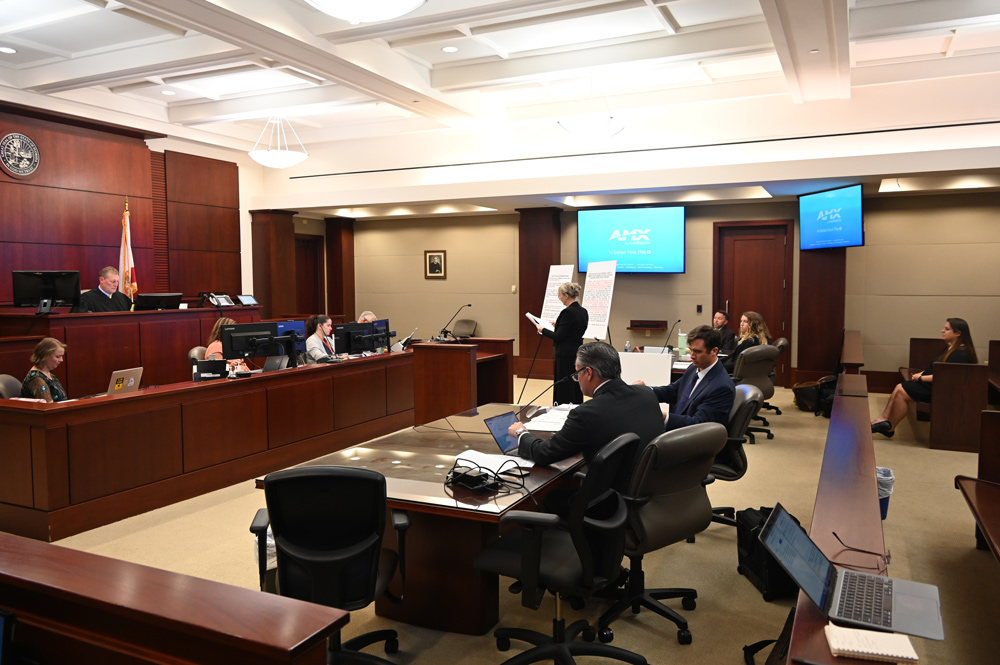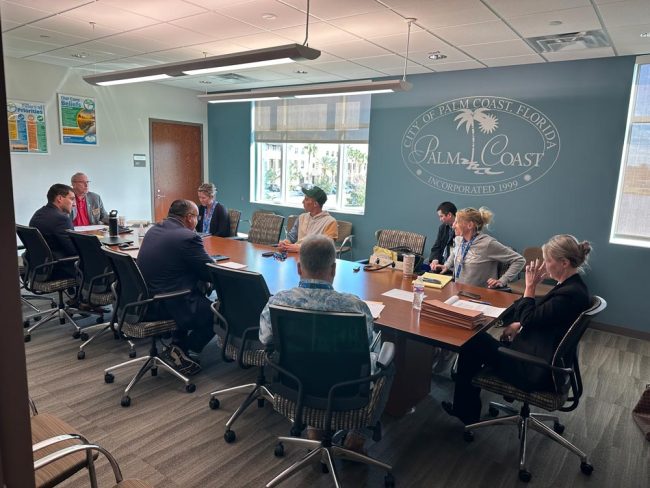
The Palm Coast City Council was rooting against itself.
When the Palm Coast City Council met behind closed doors on Oct. 18 to discuss a lawsuit against the council’s proposed ballot referendum to eliminate limits on city borrowing capacity, a majority of its members knew the measure would fail. They’d said so in open meetings.
What was not known until now is that a majority of the council, and the attorney they’d hired to fight the lawsuit, were rooting for the judge to rule against the city–or at least thought that to be the best case scenario for the city. The city’s primary aim was no longer hoping for any kind of electoral success for the measure (which failed decisively), but avoiding liability for the city. Avoiding more lawsuit. To that end, the council majority was eager for Circuit Judge Chris France to end the risk and rule against Palm Coast.
Council member Theresa Pontieri had come to that conclusion purely as the safest, least expensive, least litigious outcome for the city. Pontieri had had her own problems with the proposed referendum and at one point voted to remove it from the ballot. But once the ballots were printed and voting began, she became adamant that the council would be wrong to reverse course. She called it disenfranchisement. She worried that if the council removed it, the city would be sued on a count of voter interference.
The attorney on the case for the city, Rachel Crews of GrayRobinson, agreed that the best outcome was for France to side against the city. “The gold standard would be, you know, fight it and have a court knock it down,” Crews said. “Because then we had no choice in it, and, you know, no one could blame us for election interference on that front, if we’re worried about that.”
Though she had her doubts about an election-interference claim (she’d never seen one in these circumstances) Crews twice made the point, according to a transcript of the closed-door session obtained by FlaglerLive. “If we fight and the judge rules against us, then that really just completely, you know, insulates us from attack for election interference,” Crews said. “Because we didn’t do anything to get it off the ballot or to change anything. So that’s the safest route to ward off other lawsuits. But the second-best thing, if you wanted to go the settlement route, would be, you know, for me to help with the language for the judge to put in certain words that make it clear that the judge thought and does think — and the judge would have to agree that it was confusing. And so that would insulate us, as well.”
That’s what the council was meeting behind closed doors for: to decide whether to accept a settlement offer from Alan Lowe, the former candidate for mayor–and friend of Council member Ed Danko–who had filed the lawsuit challenging the ballot measure and describing it in much the same terms Danko would describe it in council meetings: as a deceptive proposal that doesn’t tell voters that, if approved, it would take away voters;’ right to vote in future referendums on debt proposals exceeding $15 million, or lease terms exceeding three years.
Marcus Duffy, the city’s own attorney, inaccurately claimed at the beginning of the meeting that the city did not have time or reason to set an emergency meeting to take a vote on a settlement, if it came to that. He went as far as claiming that emergency meetings were for “emergency situations [in] dealing with some type of natural disaster, some type of hurricane.”
Crews corrected him. The situation absolutely met the criteria for an emergency, she told the council, and the council had time to set such a meeting, if need be. She also reassured the officials that any direction she’d be given would be handled swiftly. For example when asked how long she’d need to write a proposed order, if it came to a settlement, she didn’t hesitate: “One day.” And she was remarkably objective in giving the city all possible options. It would have been impossible for a council member to detect which way she leaned. She’d been blunt: “I’m here today to get direction from you guys. I don’t care what it is. I’m happy to do whatever you guys desire.”

Crews had an arsenal of strong arguments whichever way the city opted to go. But Crews could not get a consensus for a settlement. Alfin himself wasn’t willing to give it. Danko and Gambaro wanted to settle. Pontieri and Nick Klufas wanted to fight the lawsuit for the same reason Pontieri did.
Crews and almost everyone around the table did not have anything like outright confidence in the city’s position. “It’s not a slam-dunk either way at all,” Crews said, cautioning that it could go to appeal. France had to determine if the ballot language was clearly and conclusively defective, a very heavy burden for the complainant to prove. But it was an indication of the council’s distance–if not indifference at this point–from the ballot measure that most were not interested in discussing the city’s chances with France.
The distance had had startled Crews. “I haven’t heard anyone ask me about the merits of the case, but it sounds to me that you guys want a judge to make the call,” she told the officials.
Alfin would not say initially say which way he leaned, though he later spoke clearly enough to signal to Crews that the city would fight on. And he alone made what turned out to be an uncanny a prediction about how Judge France would rule. He didn’t just predict the ruling would go in the city’s favor, but he predicted some of France’s reasoning: “The judge at some point is going to be thinking, ‘Okay. The public has an inherent responsibility to do their homework, read the stuff, and vote,'” Alfin said. “And quite frankly, I’m thinking — I don’t know Judge France — well, I do know Judge France, but I have no idea how he would think — is not going to want to tamper with an election much either, because that’s a little bit precedential for him. That’s not for me to say. That’s a forecast.”
The forecast was dead on.
So was Pontieri’s when she saw the measure failing at the ballot box, even if France ruled it appropriate for the ballot: the measure failed by an 18-point margin.
Still, the council came close a few times to going with a settlement, because it gave the city a chance to control the message. Crews recommended wording the settlement in such a way as to protect the city from an election interference claim. There was no risk to the city if the city lost the suit. “If you go the voluntary route, you can massage the Court’s language,” Crews said. “We’re going to tell the Court what to sign. So we can say it’s confusing, but maybe not go as far as to be misleading. So you don’t want — you have more control of the court order.”
All along, Danko again and again pushed for the settlement. He’d made no secret of his active involvement in the matter beyond the council–a role for which he’d be censured by his colleagues in the council’s last business meeting on Nov. 12. When Klufas raised questions about Lowe’s past as a “sovereign citizen,” Danko got upset, accusing Klufas of “dragging Alan’s reputation through the mud.”
Aside from moments of tension and sharp exchanges, including some between Pontieri and Danko, the hour-long session was civil, with Alfin more effectively controlling the tenor of the meeting than–his prediction aside–contributing substantive strategy. He was worried about precedent, though he didn’t explain how that would be relevant.
Alfin was also still bullish on what the ballot measure would do, if it passed: “The presentations made before city council represent the potential, if they’re realized, for millions of dollars in alternative revenue sources. I need to make sure that that is spoken for the record.” What he did not make clear for the record was that the new revenue would be leaden with strings that debt brings–whether it is the indebtedness to bond holders or to private partners in the city’s faddish attraction to “P3″‘s, or public-private partnerships. “Is there risk in that? Of course. Is it for sure? No,” Alfin said.
Alfin, Danko and Klufas are no longer on the council. Danko and Pontieri spoke at length about the “stain” the referendum would leave on the future council if, in Danko’s view, it was allowed to stay on the ballot.
“The stain is here,” Pontieri said. Regardless of the way the ballot measure would fare, she said she would be tackling the issue again with the new council to do it better. She just didn’t want to legitimize an “inherently flawed lawsuit” and cave to the pressures, political and otherwise, to settle, when the judge could simply declare the suit flawed (which he did not). “To the credibility of council now and in the future,” Pontieri said, “I think it sets a more dangerous precedent to be able to vote legislatively and then come back later and take something off of a ballot as council.”
![]()





























Ed Danko, former Vice-Mayor Palm Coast says
While the city is in desperate need of money for a new water treatment plant, Alfin, Klufas and Pontieri pissed away thousands of dollars in lawyer fees to defend Charter Amendment 1 in court, knowing full well the voters would reject it in the end. No doubt Pontieri will try to resurrect “Alfin Bonds.” Flush twice, it’s a long way to City Hall.
YankeeExPat says
Hello former Vice-Mayor of Palm Coast !
How is Joe Mullins, Alan Lowe, Victor Barbosa and the rest of the Palm Coast Swampsters doing to pass the time away ?……. still looking for those missing votes perhaps ?
Libertarian says
Let’s hope the new council doesn’t devolve into crony, backroom development deals, masquerading as public-private partnerships. Property developers can accept all the risk for their privately-funded projects. No need for taxpayers to share in that risk. We don’t want Palm Coast to become a haven for corporate welfare. Keep taxes and spending low.
Alex says
The Clown Show right to the end.